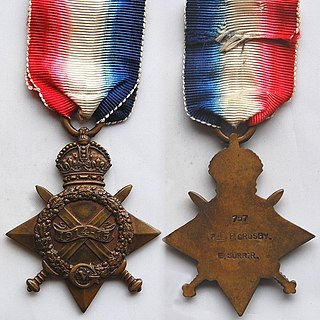 W
WThe 1914–15 Star is a campaign medal of the British Empire which was awarded to officers and men of British and Imperial forces who served in any theatre of the First World War against the Central European Powers during 1914 and 1915. The medal was never awarded singly and recipients also received the British War Medal and Victory Medal.
 W
WThe 1939–1945 Star is a military campaign medal instituted by the United Kingdom on 8 July 1943 for award to British and Commonwealth forces for service in the Second World War. Two clasps were instituted to be worn on the medal ribbon, Battle of Britain and Bomber Command.
 W
WThe Afghanistan Medal was instituted by Queen Elizabeth II on the advice of the Australian Prime Minister John Howard in 2004. The Afghanistan Medal is awarded to Australian defence force personnel who served in or around Afghanistan after 11 October 2001. Defence force personnel are also recognised by the 'ICAT' clasp to the Australian Active Service Medal and the North Atlantic Treaty Organisation's Non-Article 5 Medal with 'ISAF' clasp.
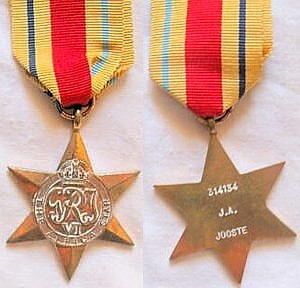 W
WThe Africa Star is a military campaign medal, instituted by the United Kingdom on 8 July 1943 for award to British and Commonwealth forces who served in North Africa between 10 June 1940 and 12 May 1943 during the Second World War.
 W
WThe Air Crew Europe Star is a military campaign medal, instituted by the United Kingdom in May 1945 for award to British and Commonwealth air crews who participated in operational flights over Europe from bases in the United Kingdom during the Second World War.
 W
WThe ANZAC "A" badge is a brass insignia authorised in November 1917 for members of the First Australian Imperial Force who had served as a member of the Australian and New Zealand Army Corps (ANZACs) during the Gallipoli campaign in 1915. In 1918, eligibility was extended to those who had served at Lemnos, Imbros and Tenedos and the transports and hospitals off Gallipoli as well as the communications line to Egypt.
 W
WThe Arctic Star is a military campaign medal instituted by the United Kingdom on 19 December 2012 for award to British Commonwealth forces who served on the Arctic Convoys north of the Arctic Circle, during the Second World War.
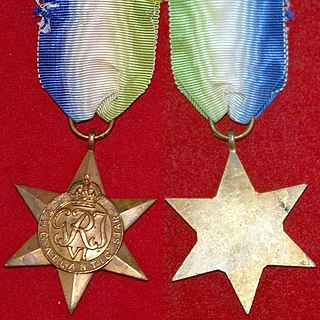 W
WThe Atlantic Star is a military campaign medal, instituted by the United Kingdom in May 1945 for award to British Commonwealth forces who took part in the Battle of the Atlantic, the longest continuous campaign of the Second World War.
 W
WThe Australia Service Medal 1939–1945 recognises service in Australia's armed forces, Mercantile Marine and Volunteer Defence Corps during World War II.
 W
WThe Australian Active Service Medal (AASM) is an Australian military decoration. It was authorised on 13 September 1988 to recognise prescribed service in "warlike" operations, backdated to February 1975. It is awarded with a clasp to denote the prescribed operation and subsequent awards of the medal are made in the form of additional clasps. In 2012, it was announced that the medal would no longer be issued for future operations, with the AASM and the Australian Service Medal being replaced by the Australian Operational Service Medal.
 W
WThe Australian Active Service Medal 1945–1975 recognises the service of Australian Defence Force and certain other persons in prescribed warlike operations in the period after World War II, and prior to February 1975. The medal was established in December 1997. The Australian Active Service Medal recognises warlike service after February 1975.
 W
WThe Australian General Service Medal for Korea (AGSMK) recognises former defence force personnel who completed 30 days of service in operations in South Korea, including any location 161 km (100 mi) seaward from the coast of South Korea, during the post-Armistice period, 28 July 1953 to 19 April 1956. The medal was established by letters patent by Queen Elizabeth II on 24 November 2009 and further determination approved by the Governor General on 12 March 2010. The AGSMK was announced on 12 February 2010 by the Parliamentary Secretary for Defence Support, the Hon Dr Mike Kelly AM MP, following the recommendations of the 2005 Post-Armistice Korean Service Review.
 W
WThe Australian Operational Service Medal is a campaign medal established on 22 May 2012 to recognise service by Australian Defence Force (ADF) personnel on designated hazardous operations. It may also be awarded to civilians who serve alongside the ADF on designated operations under specific conditions.
 W
WThe Australian Service Medal is an Australian military decoration. It was authorised 13 September 1988 to recognise prescribed service in peacekeeping and non-warlike operations. It is awarded with a clasp to denote the prescribed operation and subsequent awards of the medal are made in the form of additional clasps. The Australian Service Medal 1945–1975 recognises non-warlike service prior to February 1975.
 W
WThe Australian Service Medal 1945–1975 recognises service in peacekeeping or non-warlike operations in the 30-year period following World War II, and prior to February 1975. The medal was established on 22 February 1995. The Australian Service Medal recognises non-warlike service after February 1975.
 W
WThe British War Medal is a campaign medal of the United Kingdom which was awarded to officers and men of British and Imperial forces for service in the First World War. Two versions of the medal were produced. About 6.5 million were struck in silver and 110,000 in bronze, the latter awarded to, among others, the Chinese, Maltese and Indian Labour Corps.
 W
WThe Burma Star is a military campaign medal, instituted by the United Kingdom in May 1945 for award to British and Commonwealth forces who served in the Burma Campaign from 1941 to 1945, during the Second World War.
 W
WThe Defence Medal is a campaign medal instituted by the United Kingdom in May 1945, to be awarded to citizens of the British Commonwealth for both non-operational military and certain types of civilian war service during the Second World War.
 W
WThe France and Germany Star is a military campaign medal, instituted by the United Kingdom in May 1945 for award to British Commonwealth forces who served in France, Belgium, Luxembourg, the Netherlands or Germany and adjacent sea areas between 6 June 1944 and 8 May 1945, during the Second World War.
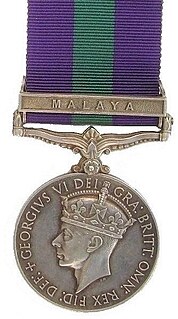 W
WThe General Service Medal was instituted to recognise service in minor Army and Royal Air Force operations for which no separate medal was intended. Local forces, including police, qualified for many of the clasps, as could units of the Indian Army prior to 1947.
 W
WThe General Service Medal, is a campaign medal of the United Kingdom introduced in 1962 to replace both the General Service Medal (1918), as awarded to the Army and RAF, and the Naval General Service Medal (1915). The 1962 GSM was awarded until 2007, when it was replaced by the Operational Service Medal. In 2015 the General Service Medal (2008) was introduced.
 W
WThe International Force East Timor (INTERFET) Medal recognises members of the Australian Defence Force who served for 30 days in East Timor during the INTERFET campaign. The qualifying area comprises East Timor and the sea adjacent to East Timor out to a distance of 12 nautical miles (22 km) from the low water mark.
 W
WThe Iraq Medal was instituted by Queen Elizabeth II on the advice of the Australian Prime Minister John Howard in 2004. The Iraq Medal is awarded to Australian Defence Force (ADF) personnel who served in or around Iraq. ADF personnel are also recognised by the 'IRAQ 2003' clasp to the Australian Active Service Medal.
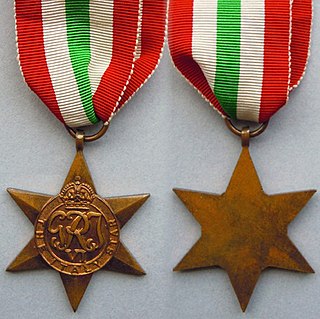 W
WThe Italy Star is a military campaign medal, instituted by the United Kingdom in May 1945 for award to British Commonwealth forces who served in the Italian Campaign from 1943 to 1945, during the Second World War.
 W
WThe King's Badge is a large silver lapel badge authorised by the Ministry of Pensions in the early part of the Second World War and initially issued to servicemen who, as a result of their injuries, had been discharged from active service. It was to be worn only on civilian clothing and by the end of 1941 over 8,000 had been awarded.
 W
WThe Korea Medal, sometimes referred to as the Queen's Korea Medal to distinguish it from the United Nations Service Medal, is a campaign medal created in 1951 to recognize troops from Australia, Canada, New Zealand, and the United Kingdom who had given either one day's service in an air sortie over Korea, or 28 days service offshore, during the Korean War. The medal was identical in all countries where it was awarded, except for Canada where it contained unique elements. An award distributed across the Commonwealth, the Korea Medal holds a different place in each country's order of precedence for honours.
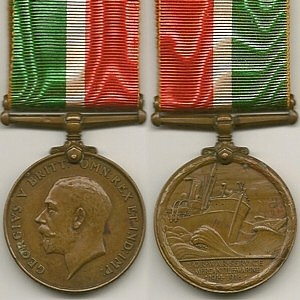 W
WThe Mercantile Marine War Medal was established in 1919 and awarded by the Board of Trade of the United Kingdom to mariners of the British Mercantile Marine for service at sea during the First World War.
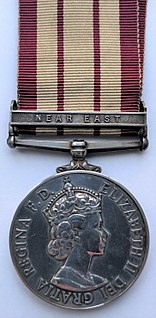 W
WThe Naval General Service Medal was instituted in 1915 to recognise service by the Royal Navy and Royal Marines in minor campaigns that would not otherwise earn a specific campaign medal. The Army/Air Force equivalent was the General Service Medal (1918). Both these medals were replaced by the General Service Medal in 1962.
 W
WThe Pacific Star is a military campaign medal instituted by the United Kingdom in May 1945 for award to British and Commonwealth forces who served in the Pacific Campaign from 1941 to 1945, during the Second World War.
 W
WThe Rhodesia Medal was initiated by the British Government in consultation with Australia, New Zealand, Fiji and Kenya, whose forces took part in Operation AGILA,. The role of the multi-national force was to keep peace between 22,000 guerrilla fighters and the Rhodesian forces during the ceasefire and run-up to the 1980 elections.
 W
WThe Victory Medal is a United Kingdom and British Empire First World War campaign medal.
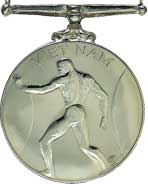 W
WThe Vietnam Logistic and Support Medal was issued to recognise the service of Australian support personnel during the Vietnam War.
 W
WThe Vietnam Medal was a joint Australian and New Zealand campaign medal awarded for service in the Vietnam War.
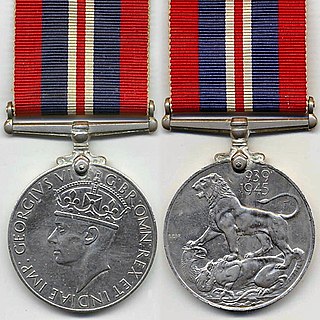 W
WThe War Medal 1939–1945 is a campaign medal which was instituted by the United Kingdom on 16 August 1945, for award to citizens of the British Commonwealth who had served full-time in the Armed Forces or the Merchant Navy for at least 28 days between 3 September 1939 and 2 September 1945.